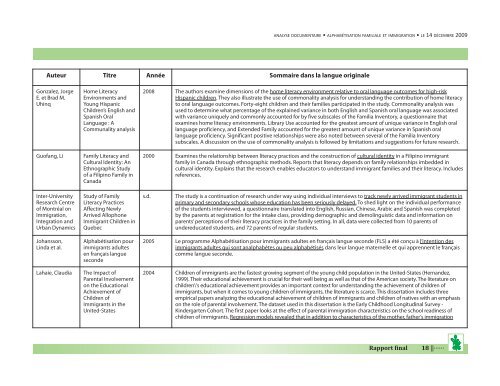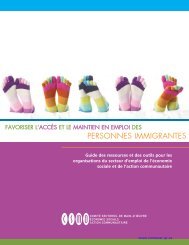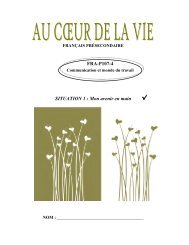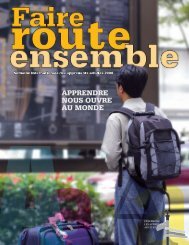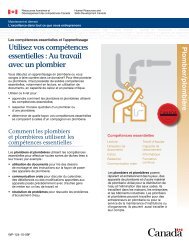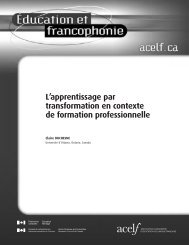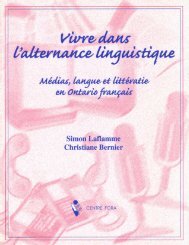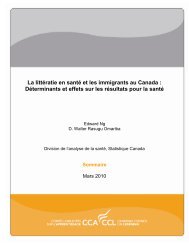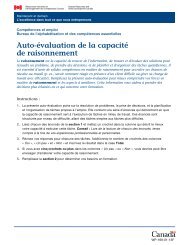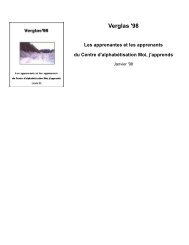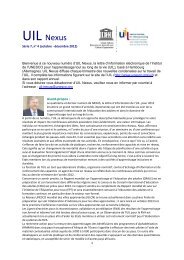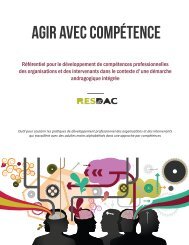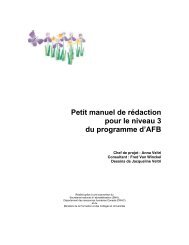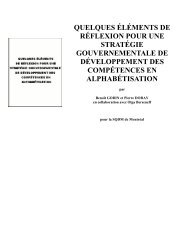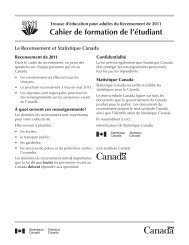L'alphabétisation familiale et l'immigration en milieu - Base de ...
L'alphabétisation familiale et l'immigration en milieu - Base de ...
L'alphabétisation familiale et l'immigration en milieu - Base de ...
- No tags were found...
You also want an ePaper? Increase the reach of your titles
YUMPU automatically turns print PDFs into web optimized ePapers that Google loves.
ANALYSE DOCUMENTAIRE • ALPHABÉTISATION FAMILIALE ET IMMIGRATION • LE 14 DÉCEMBRE 2009Auteur Titre Année Sommaire dans la langue originaleGonzalez, JorgeE. <strong>et</strong> Brad M.UhinqGuofang, LiHome LiteracyEnvironm<strong>en</strong>ts andYoung HispanicChildr<strong>en</strong>’s English andSpanish OralLanguage : ACommunality analysisFamily Literacy andCultural Id<strong>en</strong>tity: AnEthnographic Studyof a Filipino Family inCanada2008 The authors examine dim<strong>en</strong>sions of the home literacy <strong>en</strong>vironm<strong>en</strong>t relative to oral language outcomes for high-riskHispanic childr<strong>en</strong>. They also illustrate the use of commonality analysis for un<strong>de</strong>rstanding the contribution of home literacyto oral language outcomes. Forty-eight childr<strong>en</strong> and their families participated in the study. Commonality analysis wasused to d<strong>et</strong>ermine what perc<strong>en</strong>tage of the explained variance in both English and Spanish oral language was associatedwith variance uniquely and commonly accounted for by five subscales of the Familia Inv<strong>en</strong>tory, a questionnaire thatexamines home literacy <strong>en</strong>vironm<strong>en</strong>ts. Library Use accounted for the greatest amount of unique variance in English orallanguage profici<strong>en</strong>cy, and Ext<strong>en</strong><strong>de</strong>d Family accounted for the greatest amount of unique variance in Spanish orallanguage profici<strong>en</strong>cy. Significant positive relationships were also noted b<strong>et</strong>we<strong>en</strong> several of the Familia Inv<strong>en</strong>torysubscales. A discussion on the use of commonality analysis is followed by limitations and suggestions for future research.2000 Examines the relationship b<strong>et</strong>we<strong>en</strong> literacy practices and the construction of cultural id<strong>en</strong>tity in a Filipino immigrantfamily in Canada through <strong>et</strong>hnographic m<strong>et</strong>hods. Reports that literacy <strong>de</strong>p<strong>en</strong>ds on family relationships imbed<strong>de</strong>d incultural id<strong>en</strong>tity. Explains that the research <strong>en</strong>ables educators to un<strong>de</strong>rstand immigrant families and their literacy. Inclu<strong>de</strong>srefer<strong>en</strong>ces.Inter-UniversityResearch C<strong>en</strong>treof Montréal onImmigration,Integration andUrban DynamicsStudy of FamilyLiteracy PracticesAffecting NewlyArrived AllophoneImmigrant Childr<strong>en</strong> inQuebecs.d.The study is a continuation of research un<strong>de</strong>r way using individual interviews to track newly arrived immigrant stud<strong>en</strong>ts inprimary and secondary schools whose education has be<strong>en</strong> seriously <strong>de</strong>layed. To shed light on the individual performanceof the stud<strong>en</strong>ts interviewed, a questionnaire translated into English, Russian, Chinese, Arabic and Spanish was compl<strong>et</strong>edby the par<strong>en</strong>ts at registration for the intake class, providing <strong>de</strong>mographic and <strong>de</strong>molinguistic data and information onpar<strong>en</strong>ts’ perceptions of their literacy practices in the family s<strong>et</strong>ting. In all, data were collected from 10 par<strong>en</strong>ts ofun<strong>de</strong>reducated stud<strong>en</strong>ts, and 72 par<strong>en</strong>ts of regular stud<strong>en</strong>ts.Johansson,Linda <strong>et</strong> al.Lahaie, ClaudiaAlphabétisation pourimmigrants adultes<strong>en</strong> français languesecon<strong>de</strong>The Impact ofPar<strong>en</strong>tal Involvem<strong>en</strong>ton the EducationalAchievem<strong>en</strong>t ofChildr<strong>en</strong> ofImmigrants in theUnited-States2005 Le programme Alphabétisation pour immigrants adultes <strong>en</strong> français langue secon<strong>de</strong> (FLS) a été conçu à l’int<strong>en</strong>tion <strong>de</strong>simmigrants adultes qui sont analphabètes ou peu alphabétisés dans leur langue maternelle <strong>et</strong> qui appr<strong>en</strong>n<strong>en</strong>t le françaiscomme langue secon<strong>de</strong>.2004 Childr<strong>en</strong> of immigrants are the fastest growing segm<strong>en</strong>t of the young child population in the United-States (Hernan<strong>de</strong>z,1999). Their educational achievem<strong>en</strong>t is crucial for their well being as well as that of the American soci<strong>et</strong>y. The literature onchildr<strong>en</strong>\‘s educational achievem<strong>en</strong>t provi<strong>de</strong>s an important context for un<strong>de</strong>rstanding the achievem<strong>en</strong>t of childr<strong>en</strong> ofimmigrants, but wh<strong>en</strong> it comes to young childr<strong>en</strong> of immigrants, the literature is scarce. This dissertation inclu<strong>de</strong>s threeempirical papers analyzing the educational achievem<strong>en</strong>t of childr<strong>en</strong> of immigrants and childr<strong>en</strong> of natives with an emphasison the role of par<strong>en</strong>tal involvem<strong>en</strong>t. The datas<strong>et</strong> used in this dissertation is the Early Childhood Longitudinal Survey -Kin<strong>de</strong>rgart<strong>en</strong> Cohort. The first paper looks at the effect of par<strong>en</strong>tal immigration characteristics on the school readiness ofchildr<strong>en</strong> of immigrants. Regression mo<strong>de</strong>ls revealed that in addition to characteristics of the mother, father‘s immigrationRapport inal 18 ||······


